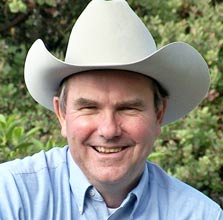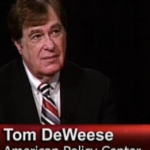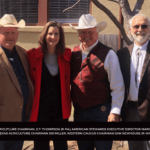Whose Country Is This?
by Lee Pitts

There’s just something particularly galling about a secretive international tribunal telling a country, any country, what it can and cannot do. That’s especially true when a controversial trade organization tells us that we cannot inform the American consumer where her food came from.
According to every survey we’ve seen the vast majority of American consumers want labels on their food informing them of its origin. Some survey indicated that as many as 90 percent of American consumers want such country of origin (COOL) labels. Additionally, every survey we’ve ever seen indicates that the vast majority American ranchers also want the beef they raise to be labeled as being produced in the good old U.S. of A. So when American grocers finally began putting COOL labels on cuts of beef, lamb, chicken, pork, and hamburger it seems everyone got what they wanted. Everyone that is except the National Cattlemen’s Beef Association, the beef packer’s lobby, the National Pork Producers and an organization that most Americans know little about, the World Trade Organization.
Unfortunately for the ranchers and consumers it is this latter group, the WTO, who will decide whether or not American consumers and ranchers will get their wish to have the meat they produce and consume labeled as to country of origin.
How and why we in America ever gave an organization located in Geneva, Switzerland, the right to tell us what we can and cannot do is a dirty little secret being kept by supposedly patriotic American politicians, lobbyists and multinational American-based corporations who don’t want you to know any more about them than they do the food you eat.
I Pledge Allegiance To The WTO
Opponents of country-of-origin-labeling say it is nothing more than a protectionist trade measure that we are using to discourage imports. And these critics might have a point if all the food in the world was the same and was produced under the same rigid health and environmental standards. But clearly it is not. As proof we offer up milk from China that was contaminated with melamine, European and Canadian mad cows, four legged Mexican TB carriers and South American bovines with Foot and Mouth disease.
We’d like to point out amidst all the brouhaha that country of origin labeling does not stop one single animal from entering this country, nor does it prevent any country from selling us beef. Of these facts there can be no debate. What COOL does do is give the American consumer the ability to find out where the food she feeds her family came from. The decision on whether or not to buy foreign or domestic beef lies solely with her, not some bureaucrats at a meeting in Cancun. That’s why we were devastated after years of watching COOL work its way through the bureaucratic and political morass that after it was finally put in place the WTO said last November that it was illegal. Not according to American laws, but according to theirs.
I don’t remember the founding fathers ever mentioning the WTO, do you? I can’t find it anywhere in the Constitution or The Bill of Rights, nor do I recall ever getting a chance to vote on its leaders, or having a say in its proceedings. I can find no evidence that any of our founding fathers were members in good standing of the WTO.
Such is the sad state of American politics these days that we held out little hope that anyone in our government would challenge the WTO’s COOL ruling, so we were surprised and pleased when the office of the U.S. Trade Representative announced that it was appealing the WTO ruling against the U.S. mandatory COOL law.
One Family’s Food Fight
After COOL was put in place as a result of provisions in the 2008 Farm Bill, Canada then requested consultations with U.S. trade representatives in December of 2008 concerning their objections to it. Canada alleged at the time that the mandatory COOL was inconsistent with the United States’ obligations under the WTO Agreement.
Shortly thereafter, Mexico and Nicaragua announced they had problems with COOL, too, and requested to join the consultations. Then on November 19, 2009, a three-person WTO panel was formed and eventually came to the conclusion that yes, Canada and Mexico were right and that we had no right to implement COOL in the first place. The WTO panel determined that the COOL measure “is a technical regulation and that it is inconsistent with the United States’ WTO obligations.” In particular, the panel found that as a result of COOL we gave less favorable treatment to imported Canadian and Mexican cattle and hogs than to like domestic products.
By the words “less favorable treatment” we can only assume that the WTO meant that because American consumers would theoretically prefer domestic product over a foreign one, that COOL created a premium for U.S. beef and pork and a discount for Canadian and Mexican meat. Which, if you’ll recall, was the exact point made by COOL supporters to begin with. And the premiums recently being given to age and sourced domestic cattle seem to back that up, after all, those premiums are not all the result of our export market. Those cattle aren’t all being sold to Japan and Korea.
The WTO was created in the first place by one-worlders who think there should be no geopolitical boundaries and that we are all just one big happy family. To hear them tell it, all this fuss over COOL is just a food fight amongst family members.
A party can appeal a WTO panel’s ruling and due to the marriage of big business and government these days in Washington, we had little hope of that happening when it came to COOL. But on the last day an appeal could be filed came word of one. Now comes a two to three-month WTO process where yet another panel will meet behind closed doors to consider the appeal. (WTO appeals have to be based on points of law, such as legal interpretation — they cannot reopen factual findings made by the panel.)
As a result of the appeal we found out that the WTO never said in the first place that the U.S. does not have the right under WTO rules to adopt mandatory COOL. No, what the three-person panel didn’t like was the way COOL “provided less favorable treatment to Canadian and Mexican livestock producers.” They also did not like that “the COOL statute is more trade restrictive than necessary.” In other words, they did not like the fact that lo and behold, American consumers did actually prefer American beef and pork over imported beef.
Whose Side Are They On?
As to be expected from an organization that seems to be more interested in looking out for the interests of big packers than they do American ranchers, the NCBA quickly expressed their disappointment that the U.S. would even dare to file an appeal. “We are very disappointed in this decision,” said NCBA vice president Bob McCann. “Instead of working diligently to bring the United States into WTO compliance, our government has opted to engage in an appeal process, which jeopardizes our strong trade relationship with Canada and Mexico, the two largest importers of U.S. beef, An appeal is the wrong answer and a waste of valuable resources, This appeal will do nothing but escalate tension with our valuable trade partners and will prolong an issue that could be resolved quickly. We should be working toward a solution instead of creating a bigger problem.
“NCBA will engage with Canada and Mexico in order to prevent any retaliatory action that could occur from this unfortunate decision made by the U.S. government.”
Concluded NCBA’s McCann, “Cattlemen deserve a government that fights for and protects our opportunities. We need a government that not only demands WTO compliance of our trade partners but one that ensures the United States is abiding by these same guidelines.”
That bears repeating; in the words of the NCBA, what we need is a government that “demands WTO compliance.” One would think from such statements that the NCBA was getting its funding from the governments and stock raiser’s groups in Canada and Mexico, rather than the $50 million it gets each year from Beef Checkoff, funds paid overwhelmingly by American ranchers. (That 50 million dollars represents 80 percent of NCBA’s total revenue.) It should also be noted that the packers in the U.S. want their cheap imports to still be marked with a USDA inspection label to fool customers into thinking it’s a domestic product. The packers sure are getting a big bang for the buck they DON’T HAVE TO PAY to the checkoff.
Word Games
As you’d expect, R-CALF, who worked extremely hard to get COOL implemented, had a different take on the WTO appeal than the NCBA. “We’re extremely thankful that our U.S. Trade Representative has chosen to defend our constitutionally-passed COOL law,” said R-CALF COOL Committee Chair, Mike Schultz. “But, we’re in a no-win situation regarding this frontal attack on our COOL law because our nation should not tolerate for an instant a foreign entity’s efforts to undermine our constitutionally-passed domestic laws in the first place.”
As for NCBA’s role in the process, R-CALF CEO Bill Bullard had this to say: “Several powerful corporate industry groups are actually supporting the WTO’s efforts to undermine our U.S. COOL law, including the National Cattlemen’s Beef Association (NCBA) and the American Meat Institute (AMI). These groups don’t want U.S. consumers to know if they are buying beef produced exclusively in the United States or if their beef was produced in Nicaragua, Honduras, Mexico, or any one of the more than a dozen countries where U.S. corporations source their beef.”
Like us, R-CALF’s Bullard had a problem with the WTO panel word game in which they said, that yes, the United States has a right to implement a COOL program but that we implemented it in the wrong way. (They don’t say what is the right way.)
“This is nothing more than semantics,” said Bullard. “and the WTO is far too coy to have attacked our domestic law in any other way than it did. The fact is that the WTO accomplished its objective by ruling on the one hand that COOL was too rigid and treated foreign product less favorably than domestic product, but on the other hand, it ruled that COOL was too flexible and therefore nullified the COOL law’s objective.”
Our government is sure sending mixed messages to cattlemen these days. On one hand the USDA wants to be able to track our livestock from birth to the grocery store so that they supposedly can protect the consumer from foreign diseases, while on the other hand they don’t want supermarkets to tell their customers what country the meat they are selling came from. Is all this making sense to anyone?
“Nonsensical and Baseless”
In theory, members of the WTO gain access to each other’s markets on even terms. This means that no two nations can have sweetheart trade pacts without granting the same terms to every other nation, or at least every other nation in WTO. Granted, that’s a great concept and a worthy goal. But since the WTO was founded in 1995 it has proven that’s not at all what they are about. Some analysts have called the WTO, “The most powerful legislative and judicial body in the world.” What makes the WTO so powerful is that its rules can be enforced through trade sanctions. If, for example, the U.S. loses its appeal over COOL and then does not change or eliminate COOL, then we can be fined, or have trade sanctions imposed against us. In some cases WTO can even exact their pound of flesh by punishing industries not even remotely related to the one in question. This gives the WTO more power than any other international body, even eclipsing national governments like our own.
One look at their history shows the WTO has invariably chosen the agenda of multinational corporations above the interests of local communities, the environment, and working folks. Like the United Nations and the World Bank (who they work hand-in-glove with) the WTO has undermined democracy around the world by promoting the concept of a one-world government. And they do so in secret. While the WTO says that transparency is one of their goals, they often meet behind locked doors, especially after 50,000 people showed up at their meeting in Seattle in 1999 after watching the WTO prove to be just a cheerleader for multinational corporations. Those protesters successfully shut down that WTO meeting but rather than make reforms, the WTO instead just made their meetings and deliberations even more secretive.
It’s hard to find a fan of the WTO. The left sees the WTO as lobbyist for big business, while the right says they should get out of the way and let companies and countries do business on a deal-by-deal basis. Fortunately for all of us, the WTO hasn’t exactly been a raging success.
So stay tuned, a decision on the appeal to WTO’s ruling on COOL is expected within the next 60 days. In anticipation of that event R-CALF’s Mike Schultz says, “The WTO’s anti-COOL ruling is nonsensical and baseless and we are confident the United States will prevail in this unenviable appeal.”
Nonsensical and baseless, you say?
That’s the very definition of the World Trade Organization.



